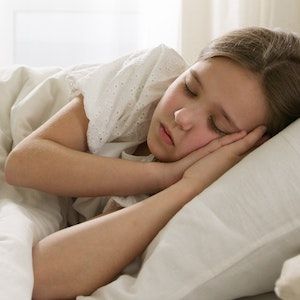Children With Asthma Face Significantly Greater Risk of Sleep-Disordered Breathing
A new study from SLEEP 2022 showed asthmatic children have a 10 times greater risk of the condition, and are twice as likely to have a history of snoring.

Respiratory burdens among people with asthma may not be reserved to just when they’re awake.
A new study showed sleep-disordered breathing is more frequent in children with asthma than the general population. The findings, presented at the Associated Professional Sleep Societies (SLEEP) 2022 Annual Meeting this week, also highlighted a viable screening tool that could help frontline clinicians interpret and initiate care on sleep-disordered breathing in higher risk groups including asthmatic children.
A team of investigators from the Employees' State Insurance Post Graduate Institute of Medical Sciences & Research in India conducted an assessment of the risk factors and prevalence of sleep-disordered breathing in children with asthma versus those without; they additionally sought to describe the polysomnographic parameters of asthmatics with sleep-disordered breather.
As they noted, children with severe and poorly controlled asthma generally face a greater risk of sleep disordered breathing, with worse consequences.
“It can lead to cardiovascular, neurocognitive, and behavioral problems,” investigators wrote. “Variable data exists currently whether demographic factors like age, sex, obesity, adeno-tonsillar hypertrophy tend to increase the risk of sleep-disordered breathing in asthmatics.”
The team recruited children with and without asthma aged 5-15 years old to participate in the case-control trial. Characteristics including age, gender, body mass index (BMI), adeno-tonsillar hypertrophy and history of snoring were collected at baseline and compared.
Trial participants completed the Sleep-Related Breathing Disorder scale, a 22-item symptom questionnaire derived from the Pediatric Sleep Questionnaire (SDBS-PSQ) that defines scores based on mean response of non-missing items answered yes (1) or no (0). Investigators sought the prevalence of sleep-disordered breathing risk, defined as ≥0.33 score on the scale.
Additionally, a subset of children with asthma and risk of sleep-disordered breathing underwent polysomnography; they were then classified into no, mild, moderate or severe disease based on apnea-hypopnea index (AHI) score.
The assessment included 120 children, of whom 60 were asthmatic. Among the asthma group, nearly two-thirds (61.7%) were male; mean patient age was 9.51 years old. Mean questionnaire score among the group of children with asthma was 0.14, versus the control group mean score of 0.05 (P = .001). Children with asthma were nearly 11-fold more likely to be diagnosed with sleep-discorded breathing (18.33% vs 1.67%; P = .001).
Children with asthma were also more than twice likely to report a history of snoring (25.0%) versus control (11.7%), while otherwise reporting similar characteristics (P >.05).
Investigators observed 11 children with asthma at risk of sleep-disordered breathing; 10 underwent polysomnography, and 9 were diagnosed with the condition. Mean AHI score among them was 4.21, while mean total sleep time was 279.23 minutes nightly and a mean arousal index of 10.23.
Indeed, the investigators concluded their findings support the suggested risk of sleep-disordered breathing in children with asthma versus those without.
“SDBS-PSQ is a useful screening tool for diagnosing sleep-disordered breathing and should be incorporated in the daily practice, the gold standard being polysomnography,” they wrote. “Further studies would help in a better understanding of sleep-disordered breathing spectrum in children.”
The study, “Prevalence and Severity of Sleep Disordered Breathing in Asthmatic Children,” was presented at SLEEP 2022.